Next to a Sacramento neighborhood, Southeast Asian homeless immigrants struggle to survive flood waters and a lack of services
The woman I’ll call May and an older man follow me to my car, parked in a nearby neighborhood that feels like a different universe. A homeowner makes us from an open garage. We try to project normalcy. Nothing to see here. Don’t mind the large homeless encampment just over the hill.
I pop my trunk. Kimberly Church loaded it with tarps, blankets, water, toilet paper and other supplies from her E.N.G.A.G.E. Inc. start-up charity. We pack the items into a hobbled wagon. The older man muscles it—sans help—up a paved hill, across light rail tracks, over a rocky stretch of railroad and down a steep embankment into a mud-soaked gully.
So this is where May and her people have been.
I first met them in the summer of 2016. The local chapter of the Sex Workers Outreach Project stumbled onto their massive encampment, scattered across a hard, sun-scabbed dirt lot by 51st Avenue and 30th Street. Almost all were immigrants of Southeast Asian descent. They subsisted in antipodal extremes—from total neglect to total crackdown.
They said the camp existed for years without detection or intervention, but a request by the property owner forced the county’s hand. The Sheriff’s Department evicted 45 occupants while code enforcement officers bulldozed tents. Cards for Sacramento Steps Forward were handed out with the wrong number. A few people got bus passes or food bank referrals. A humanitarian crisis was treated like a quality of life nuisance.
The people scattered. Less than half regrouped two miles south in another lot flanked by automotive shops. A month later, the Sacramento Police Department did the rousting. A smaller group reconnoitered four miles north at Rainbow Mini Park, but the site was too conspicuous. It was raining when the cops came.
That’s about when May’s cellphone number stopped working. In November 2018, I got an email from “the one homeless girl by the park.” She hoped I still remembered her. I meet her on January 11.
The bank stretches farther than I can see. Plywood and cardboard shelters have been built into barren tree branches; others are stacked along the shoreline. Tents, tarps, bedsheets and plastic coverings are stretched, propped and battened down with knotted wood, taut twine and heavy rocks.
“Look at this spot we’ve chosen,” May says. “It’s crazy when it floods. You not ready.”
Except for May, who is of Mien descent, everyone else is Hmong. Because of the stigma surrounding homelessness and her immigration status, I’ve agreed to withhold her real name. May, who is around 30, speaks the best English so she translates. Two other women are in the cluster, one of whom is due to give birth soon. It will be a natural childbirth like the one before it, when the woman knelt in a field next to a Catholic grade school on Franklin Boulevard.
People exit their shanties and unload supplies. This is the village that isn’t supposed to be.
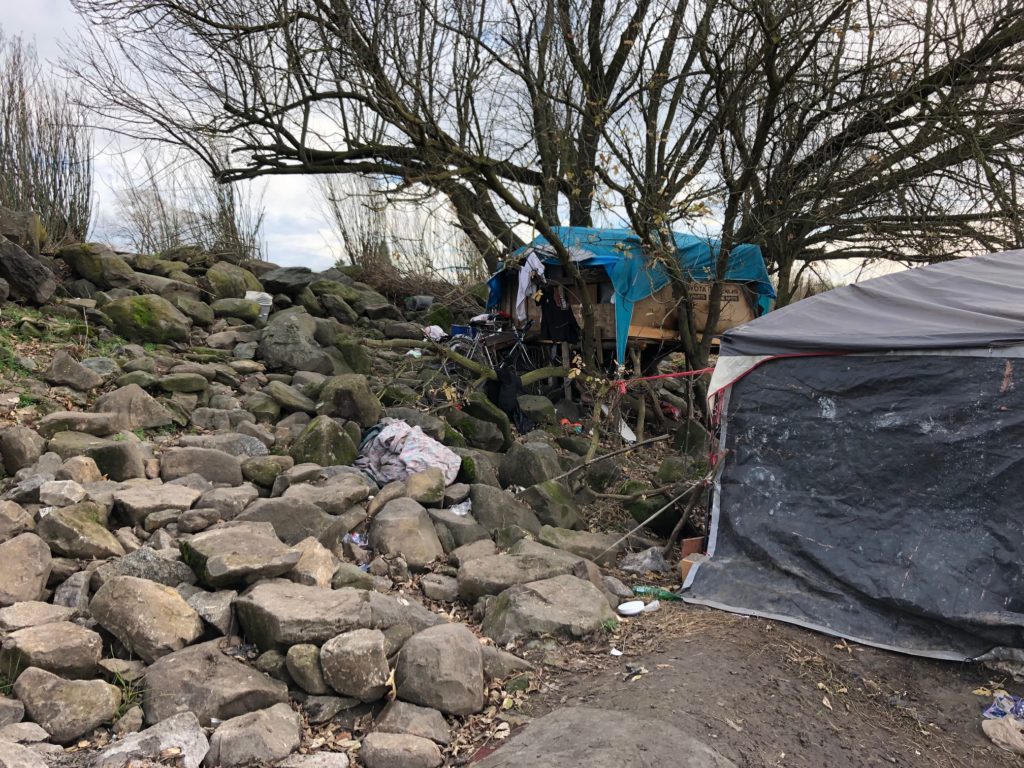
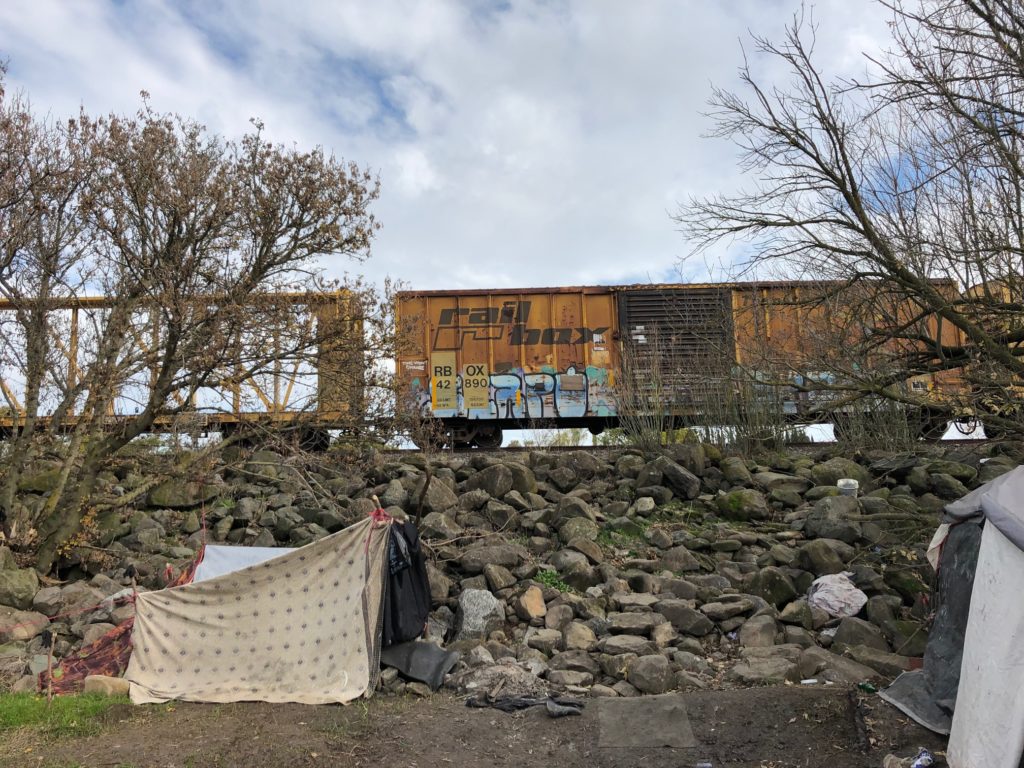
The camp abuts a stretch of railroad tracks operated by Union Pacific. 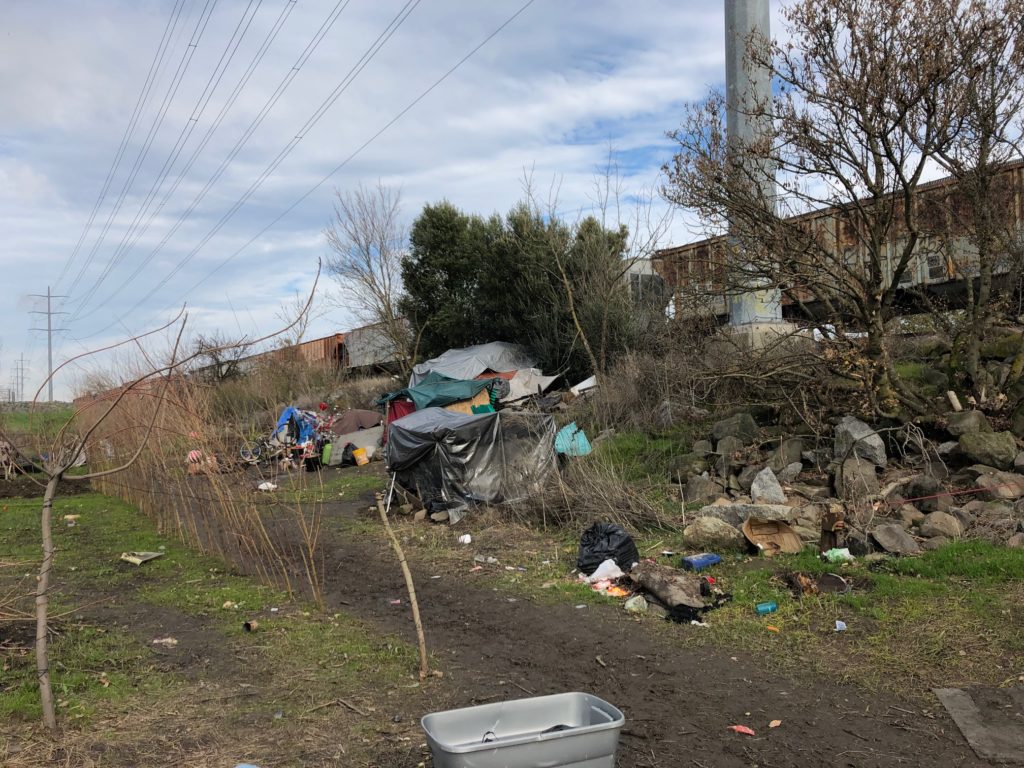
January 16-29
Rain shelled the plastic tarps. Rain sent mud spurting ankle-high and slicked sharp rocks. Rain made the creek waters rise. The police officers said it wasn’t safe to stay. They offered a ride to the city’s triage homeless shelter. May accepted. She climbed in with her dog. A male friend balked when he saw no food in the car. May believes he just got cold feet.
“Our group, we don’t trust,” she said. “That’s why I was the one to take the challenge.”
When her people were first discovered in 2016, she was among the only ones to say yes to services. A Sacramento Steps Forward navigator put her on a housing wait list. Then May lost touch with the navigator. Then she got a new one who told her she was no longer on the list.
“Ever since they told me I was off the list, I just don’t want to associate with them anymore,” she said.
The cops have been mostly hands off here, May said. Some railroad agents with Union Pacific told them to move their tree houses away from the tracks because it was unsafe. May obliged, moving her tent closer to the shore, where the rain-flooded creek now imperiled it. Officers with the city’s Police Department came once to deal with a complaint, but hadn’t yet posted a 48-hour dispersal notice, the kind that May and her people have seen many times before. The officers came on January 16 because of the rain. They told the people of the village they could be inside. May is the only one who chanced it.
“It was going to flood,” May texted. “Just me being brave I guess.”
The ride felt long. The police car crawled the length of the city. May scoped blue tarps lining Garden Highway and more of them outside the concrete warehouse where they parked. Inside the gray hangar, strange faces stared from bunks. It made May nervous, but there was a roof and that wasn’t so bad.
May stayed three nights. Bed bugs chewed her arm. The portable restrooms lacked seat covers. She paid a staff member $5 to keep watch while she showered. Her dog threw up. Her cellphone charger disappeared from the bin beside her bunk. No one talked to her about services.
But there was a roof.
May tried to get two friends in the shelter during a storm, but staff said no walk-ins. She texted me. I texted the mayor’s communications chief. She texted the city’s homeless services coordinator. The coordinator texted someone in the Police Department. Eventually the word came back. The shelter was full. No walk-ins. Her friends left. May didn’t last much longer.
She said she was the only Asian woman in the shelter, which she found chaotic and boring at the same time. She received written warnings twice for missing curfew. She had a nighttime babysitting gig across town that made it difficult to get back in time. The third time she missed curfew, she didn’t return. She left her clothes, makeup collection, bedding and $125—her entire savings. She never got them back.
January 30-31
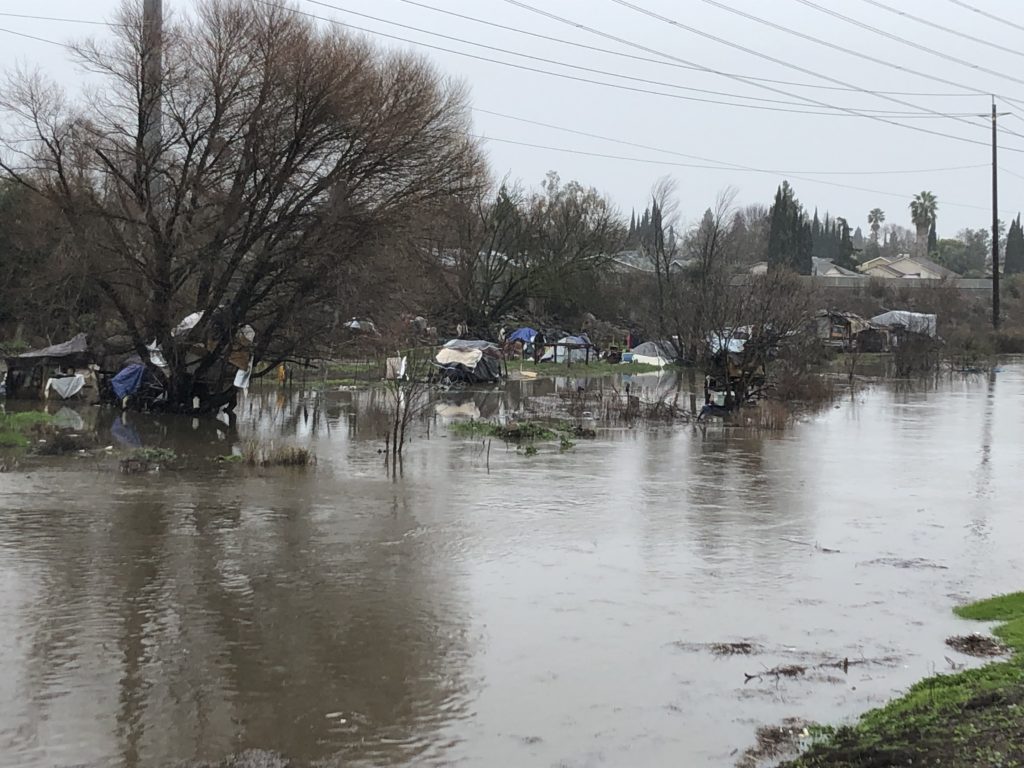
May’s dog Su Yang raises a piercing ruckus from the bottom of a muddy embankment. May shushes to no avail. She had another dog a couple years ago, a little bucktooth mutt, but he went missing. Five days later, someone told May where to find him. She found the body, beaten and eye-gouged. May didn’t want another dog after that, but then someone brought a puppy to the camp.
He was another mixed-breed—long snout and torso, floppy ears, squat legs. He was supposed to go to someone else, but crawled into May’s sleeping bag. She says he fit in her palm. A year later, he’s her protector.
“I just got myself a little tent and my dog, that’s it,” she says with a chuckle. “I live day by day.”
May laughs often. It’s a deflection. It’s permission. Don’t worry about me, the laugh says.
Some teenagers stood atop the ridge chucking rocks at the village. She laughs. She’s down to an old Army jacket with a gaping tear in the pocket. She laughs. She’s been homeless for five years now, since her dad died, the bank foreclosed on their home and she and her sister were put out. She laughs.
Her parents came to this country as immigrants and became citizens. “That’s my next goal, to get my citizenship,” she says.
But she wonders if it will be possible under this president. “It’s kind of scary because Donald Trump is trying to deport everybody, right?”
She’s not being rhetorical. Access to news is limited and filtered through social media or word-of-mouth. Real-life crises are embellished into straight-up calamities. “I heard we’re going to World War III, too,” she says.
A hazy, late morning sun cast diamonds along the fattened creek. Another storm is brewing, but May has no plans to leave. She tried being the bridge between her people and the system. But each time the system let her down. Each time her people were right: The helpers don’t help. The helpers bring trouble.
May floats an idea. Maybe she and her people could raise enough money to buy a small piece of land where they won’t be bothered. They’d share it with others in need and take care of the rest. She gestures to the shanties along the water.
“This is how people living in Thailand. You’d be amazed by what my people can come up with,” she says. “For my group of people, think about the storm—we survived it. The flood, we survived it. I don’t think we’re going anywhere.”
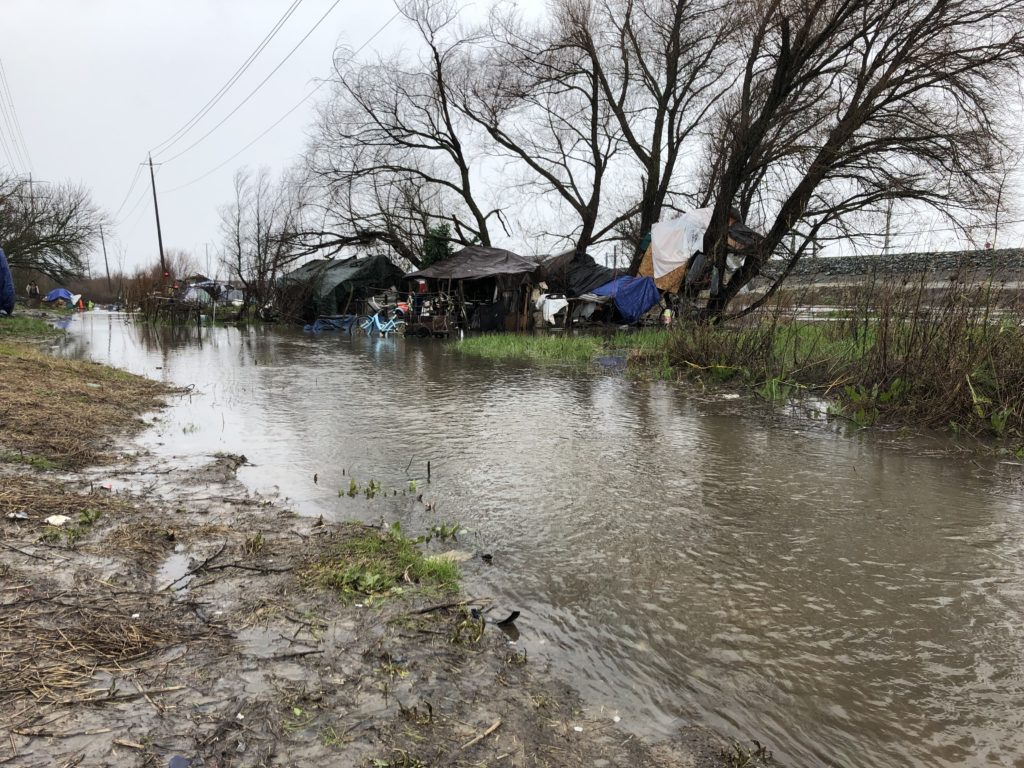
February 13-14
A man paddles through the creek’s swift currents in a canoe. His tree house is surrounded by water, dark water. It hides things. It keeps secrets. It froths with lethal intent.
Another man drags a wagon up a steep bank. People mill around and stare blankly at their teetering shelters, their sinking tents, their disappearing ground. Maybe the water will go down. Maybe the storm will break.
May watches and shivers. A wet gust lashes her hair and rakes her knuckles red. After wading calf-deep through stormwater to rescue the few possessions she has left, she stands in soggy black socks and sandals.
“That water—if you go in, you don’t come out,” she says.
Two police officers sit in a parked SUV overlooking the shanty town. After a few minutes, the patrol vehicle drives away.
The forecast is ominous. The sky is a steel gray. May asks how she and her people can get motel vouchers. I call Ben Avey at Sacramento Steps Forward. He explains that while the nonprofit used to dispense the vouchers, the county controls them and ended that arrangement.
“We don’t do outreach for the county anymore,” Avey says.
He puts me in touch with the guy at the county who does. Eduardo Ameneyro says there’s a limited supply of vouchers and fewer motels willing to accept them. But he offers to send social workers escorted by law enforcement to the camp to do an assessment. May nixes it—no cops. Ameneyro’s small team comes across homeless people who decline help all the time.
“We try to be respectful,” he says.
In the nights to come, rain pounds the hidden village. The creek waters rise fast and churn rust-brown. The vegetable garden is submerged. May doesn’t sleep. She waits for the shelling to stop. She shivers from cold and fear. May just got a new puppy she named Sunshine. By morning, Sunshine is gone. No one comes to offer a ride to the shelter. A countywide homeless count passes without anyone counting them. May and her people are reminded they are on their own.
For them that has been the best case scenario.






Be the first to comment on "On the margins of the margins"